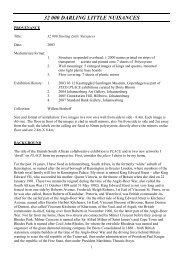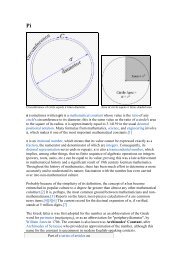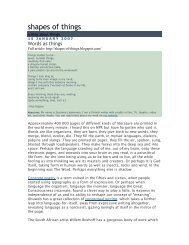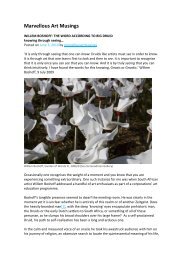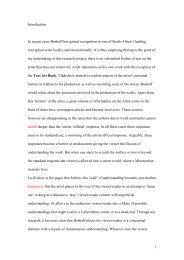Miranthe Staden Garbett Report - Willem Boshoff
Miranthe Staden Garbett Report - Willem Boshoff
Miranthe Staden Garbett Report - Willem Boshoff
Create successful ePaper yourself
Turn your PDF publications into a flip-book with our unique Google optimized e-Paper software.
develop relationships based on shared interests, values, beliefs and ideals. However<br />
ethnocentric care has limits, and this is an ‘us’ which exists only on the premise and<br />
ultimate extinction of those identified as ‘them’.<br />
Later in this stage we find the emergence of rationalism. Here the individuated self<br />
escapes from herd mentality but remains ethnocentric in its confirmation of absolutist<br />
values, this time based on the universal truths of science. This stage correlates with<br />
modernity, and the technocentric, materialist culture that has ensued tends to exploit<br />
human and natural resources in the name of progress (Wilbur 2000: 49-51). This cultural<br />
problem and the pressing need for a solution has been addressed by unanimously by<br />
ecologists. Many insist that it calls for a new paradigm or a shift in consciousness. The<br />
pluralistic relativism of postmodernism that followed the scientific achievement of<br />
modernism has gone a long way in challenging centralising myths and the coherent<br />
sense of self inherent in traditional, conformist paradigms which hold truth to be<br />
exclusive, one-sided and based on absolute principles of right and wrong. However the<br />
rationalism rejected by the sensitive, feeling, caring and contingent postmodernists,<br />
remains a key tool for releasing the grip of absolutism by making available multiple<br />
perspectives. IN fact, pluralistic relativism is the first stage to embrace the multiple<br />
perspectives made available by rationalism, while still rooted in an absolutist kind of<br />
relativism.<br />
To pinpoint the problem and its solution, Wilber (2000:137) argues the current<br />
ecological crisis is not so much rooted in the symptoms of “pollution, toxic dumping,<br />
ozone depletion or any such” but the insufficiency of what Graves calls first-tier<br />
thinking.<br />
First-tier value spheres are either selfish or ethnocentric, meaning that all previous<br />
paradigms, including traditional, mythic, conformist, conventional, rational and post<br />
rational pluralistic memes are exclusive, each one assured of its correctness and<br />
superiority. According to Wilber (2000: 137), “not enough human beings have



